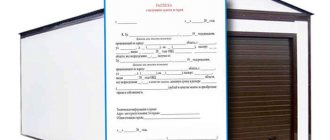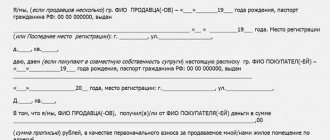Receipt for return of deposit for apartment sample
A deposit to the seller is a confirmation of the buyer’s serious intentions, a guarantee that the transaction will take place.
By providing part of the amount in advance under a formal contract, the buyer gains a lot. Firstly, he reserves the right to make a purchase in which he is interested, and secondly, if the deal falls through through no fault of his own, the second party returns him the amount of the deposit in double amount, although this will require going through legal proceedings. Payment of this amount does not obligate the parties to fulfill the terms of the agreement and is returned in full. An agreement on an advance payment when purchasing an apartment does not even have to be drawn up in writing; there is no state standard for such an agreement. It's just a condition.
Grounds for returning the deposit
Signing a deposit agreement encourages participants to comply with all clauses of the purchase and sale agreement, since their violation has tangible material consequences. If the buyer is the violator, he will forfeit the entire deposit amount. If the seller violates the conditions, he is obliged to return double the amount of the deposit to the buyer.
Buyer's refusal
A buyer may refuse to purchase an object for various reasons. However, he does not always have legal grounds for returning the deposit to him. In practice, purchases are often refused for the following reasons :
- The purchase and sale transaction follows a chain (there are several buyers and sellers), one of the participants was unable to fulfill their obligations.
- Upon re-inspection of the purchased item, previously unnoticed defects were discovered.
- The buyer did not have time to prepare all the necessary documents for the transaction on time.
When a transaction goes through a chain and several participants are involved at once, some of them may, for various reasons, fail to fulfill their obligations. Then, in the event of a specific buyer’s refusal, a refund of the deposit is possible only if the deal fell through through no fault of his.
It also happens that the buyer, upon initially inspecting the property, did not notice its defects, for example, did not identify faulty wiring or sewerage. All this was discovered by him after he paid bail. In this case, a controversial situation arises that may have to be resolved in court. But, most likely, the deposit will not be returned, since the cause of the dispute was the buyer’s carelessness.
If the buyer does not meet the deadline for preparing documents without a good reason, the money will not be returned to him. A valid reason in this case may be the illness of the buyer himself or the death of his close relative, confirmed by documentation.
Bank refusal
If a bank is involved in the transaction between the buyer and the seller, the situation with the return of the deposit may be controversial. According to the law, if we are talking about purchasing real estate with a mortgage, when independently choosing an object, the client is obliged to notify the credit institution in writing and obtain written permission to conduct such a transaction.
In practice, the bank may initially give such permission and subsequently refuse the mortgage. The same applies to issuing a real estate loan. Therefore, when the purchase of an object is carried out through a bank, it is necessary to include in the contract a clause on the return of the deposit to the buyer in the event of the bank’s refusal. Otherwise, an ambiguous situation may arise.
Seller's refusal
The seller is financially responsible for failure to comply with the terms of the contract. So, when selling an object for which a deposit was paid to third parties, he is obliged to return the deposit amount to the original buyer in double amount .
In practice, this often happens when real estate prices rise sharply. In this case, it is sometimes more profitable for the seller to give the original buyer a double deposit, but at the same time offer the property at a higher price.
If the seller refused to sell the property because the buyer did not fulfill the terms of the transaction, he is not obliged to return the amount received.
How to prepare a receipt for a deposit for an apartment
- Enter the exact name of the document being drawn up (for example, a receipt for the transfer of the deposit under the contract).
- Duplicate the details of the contract.
- Write down the word “deposit”, clarifying that this is not just money, not an advance, not cash.
- Record in writing in two versions (in numbers and in words, i.e. with decoding) the amount of the transferred amount.
- Deposit currency.
- Place and date of transfer of money and writing of the document.
The purpose of the deposit is the obligation to fulfill oral agreements between the parties to the transaction. The amount of money determined as a deposit is counted towards the full cost of the real estate appraisal. The legal validity of the deposit is enshrined in the Civil Code of the Russian Federation, Art. 380, 381 §7 ch. 23.
Documents for a secure transaction
Before transferring money to the landlord, you must make sure that all specified documents are in the original and signed by all parties.
Inventory of the owner's belongings
Things that the tenant will use. The condition of the interior decoration and all furniture defects are characterized. It is advisable to attach photographs. The more detailed the property is described, the less likely it is that disputes will arise in the future.
Lease contract
A document that states the rights and obligations of the apartment owner and the tenant. According to the legislation of the Russian Federation, the agreement must be in writing and registered with Rosreestr if:
- the transaction is carried out between a legal entity and an individual;
- the apartment is rented for 12 months or more.
A written form is preferable when transferring expensive property for temporary use or having expensive repairs in the apartment. In other cases, the Code allows agreement in oral form, but this kind of agreement will not have legal force in court.
The document must contain a clause about the amount of the deposit and the conditions for its return.
Additional documents must be attached to the contract:
- a photocopy of the passport of the owner of the rental property and the tenant;
- an extract from the Unified State Register of Real Estate as proof of the ownership rights of the owner of the rented apartment;
Loading…
Taking too long?
Reload document
| Open in new tab
- technical plan of the apartment indicating the number of rooms, total and living space.
Receipt for transfer of collateral money
This is a necessary addition to the contract in the form of a separate document. It is important to ensure that the amount is indicated in numbers and words, and that the details of the owner and tenant coincide with the details in the main agreement. It is imperative to ensure that the date on the document is current. If the deposit is paid in parts, then a separate receipt is drawn up for each part. This document does not need to be notarized.
Loading…
Taking too long?
Reload document
| Open in new tab
Only after this the deposit and payment for a month's rent are transferred to the owner.
Transfer and Acceptance Certificate
This document is signed by each participant in the transaction on the day the contract expires as a sign of the absence of claims. After signing the document, the owner returns the deposit.
Loading…
Taking too long?
Reload document
| Open in new tab
It is important to remember that page numbering and signatures of the two parties on each page of each above-mentioned document are necessary to be completely sure that none of the parties to the transaction will be able to independently change the terms in their favor.
Receipt for receipt of deposit for apartment
The most successful option for recording the fact of transfer of funds as a deposit for the purchased housing, however, is to draw up a deposit agreement with a receipt attached to it for receipt of funds, since the deposit itself implies that the parties to the agreement have a special responsibility when concluding such a transaction.
If the buyer refuses the transaction, the entire amount of the deposit must become the property of the seller. When the refusal to complete the transaction is initiated by the seller, the latter will be obliged to reimburse the buyer twice the amount of the deposit paid.
Requirements for document preparation
A receipt for receipt of a pledge is not regulated by law in form and does not require notarization.
The receipt as a document must contain data that corresponds to reality, the information must be indicated as completely and accurately as possible, and contain a date indicating when the document was issued. Participating parties must sign the guarantee receipt.
But, in the case of significant amounts provided by the mortgagor, it is advisable to have the receipt certified by a notary. When applying to the courts, you will not need to do an expensive graphological examination - the notarized receipt has been checked for authenticity and the identities appearing in the document have been verified.
The mortgage receipt contains:
- the place where the receipt is written;
- details of the parties - full name fully
- passport data – passport series and number;
- a sum of money or collateral;
- purpose of transfer - collateral indicating the number and date of the loan agreement;
- date of writing the receipt;
- signatures of the parties with mandatory decryption.
Sample of a collateral receipt
Only the original receipt of receipt of funds or other items as a guarantee of a written agreement has legal force.
No copy, even a notarized one, has legal force.
Rules for registration and a sample receipt for a deposit for an apartment
- Issue a certificate of ownership of the apartment . In the event that the property is shared, it is necessary to resolve the issue of sale with the other owner of the property.
- Title document nt. That is, a certificate on what basis the seller received this property (as a result of purchase, exchange, donation, inheritance).
- Owner's passport.
- Conclusion from the technical expertise bureau (it reflects the floor plan according to the developer’s project, information about redevelopment, major repairs, etc.)
- Certificate from the house management. This will help to certify the buyer that there are no registered relatives, acquaintances or any third parties in this living space who will then be unable to be evicted.
- Extract from the Unified State Register (stating that the owner has no debts for the apartment).
- Consent of third parties to sell an apartment.
- In the case of older people , a certificate of mental health may be required. This applies to owners who have suffered a serious traumatic brain injury or complex illness that indirectly or directly affects the brain and affects capacity.
- Confirms the buyer's serious intentions.
- Guarantees the seller a quick sale of the property, since under the terms of receiving a deposit, the buyer undertakes to pay the remaining amount within a certain period of time.
- The transaction involves paying 10% of the cost of the apartment, which significantly eases the burden on the buyer (this amount is deducted from the total cost) and helps the seller resolve current financial issues (if there are property debts or similar obligations).
We recommend reading: Kindergarten turn to find out
Receipt for Return of Deposit for Apartment Sample
And only if the “violator” of the agreement turns out to be intractable and the matter comes to court, then during the proceedings the invalidity of the terms of the deposit comes up and it is not possible to achieve their compliance. Often the case ends with the court ruling that the deposited amount be returned to the buyer, since in the absence of a legal agreement on the deposit, this money is recognized as unjust enrichment of the seller.
Hello, dear Lawyer. I have the following situation: we exchanged receipts with the seller of the apartment, gave him a deposit. But the sale and purchase transaction did not take place for the reason that I was unable to sell my property because the buyers let me down. The seller of the apartment I wanted to buy refuses to return the deposit. He is right? Should I go to court and whose side will He be on? A little later, the Seller said that he would return part of the deposit amount, now I am interested in an example (sample) of a receipt stating that I received a refund of part of the deposit. What is your opinion. Thank you in advance.
Deposit for an apartment: receipt of receipt
- The buyer has the right to see the originals of all documents that confirm the seller’s ownership of the apartment or house;
- The owner’s spouse has the right to the property upon sale, therefore his written permission for the transaction, certified by a notary, must be issued;
- An extract from the house register must indicate that all residents have been removed from the property.
You can issue a receipt for the transfer of funds when purchasing a property in the form of a special deposit agreement or as a separate document, a sample of which we will consider below. The document confirming the payment of a contribution for an apartment or house also provides for the return of funds to the buyer if for some reason the transaction does not take place. In addition, the receipt guarantees a double refund in the event that the transaction fell through due to the fault of the seller.
Deposit, advance payment and guarantee of seriousness of intentions
10.03.2011 | 4522
Does it matter what you call the amount that the buyer transfers to the seller before the transaction is concluded as evidence of the seriousness of intentions?
It is usually considered a deposit. What is it really like? Yuri Beksitov, an expert at the Zhilfond real estate agency, tells the story. TO KEEP EVERYTHING ACCORDING TO THE LAW Let's start with the fact that we still have a very young real estate market. By the way, this year will be our 20th anniversary. In 1991, the law “On the privatization of housing stock in the Russian Federation” was adopted. It is this moment that is considered the starting point; then the market for the official purchase and sale of real estate arose in Russia. 20 years is not even youth, but childhood, when compared with developed countries, where the real estate market has existed for hundreds of years. There, all the nuances of transactions have long been regulated, and the regulations have stood the test of time. Only those that have proven their viability remain. In our country, this process is still far from complete - some norms disappear, others appear. When real estate transactions began to take place, it was natural for both parties - both the buyer and the seller - to somehow secure the intentions of the parties before the transaction. An apartment is an expensive purchase, and the buyer often needs some time to collect the required amount. It is clear that a person wants to be sure that during this time the apartment he has chosen will not be bought by someone else. The seller also usually needs time to prepare for the transaction. To confirm the seriousness of intentions, they began to use a deposit. This happened somehow by itself, I think, mainly because the concept of a deposit is spelled out in the Civil Code. WHAT IS A DEPOSIT The concept of a deposit is interpreted in the law by Article 380: “A deposit is a sum of money given by one of the contracting parties in payment of payments due from it under the contract to the other party, as proof of the conclusion of the contract and to ensure its execution.” And the consequences of failure to fulfill obligations are also determined by law, this is Article 381: “If the party that gave the deposit is responsible for the failure to fulfill the contract, it remains with the other party. If the party that received the deposit is responsible for the failure to fulfill the contract, it is obliged to pay the other party double the amount of the deposit.” Very logical conditions, which, in general, did not raise any objections from anyone. Deposits in the real estate market began to be used everywhere, throughout Russia. Respectable participants in the transaction were especially pleased with the fact that in the event of disagreements between the parties, their rights could be easily defended in court. For example, the transaction did not take place due to the fault of the seller, but he refuses to return the deposit in double amount. The court will oblige him to do this. But it turned out that this outcome of the matter was not at all obvious. EVERYTHING IS DIFFERENT IN REAL ESTATE Since our real estate market is very young, legislation in this area is still developing. Sometimes, if the necessary norm is not found here, you have to use general, non-specific ones. This is exactly what happened with the deposit: the Civil Code has a corresponding article, which means it can be applied. But specifically in real estate transactions, the amount paid in advance to the seller cannot be considered a deposit. And, therefore, is not subject to a double refund if the transaction did not take place due to the fault of the seller. Any competent lawyer will prove this in court with ease. There were no such precedents in Novosibirsk, at least we are not aware of them. But it is impossible to exclude the possibility that this could happen to our clients. Therefore, about five years ago (immediately as soon as this information appeared), Housing Fund abandoned the practice of concluding agreements on deposits. We just moved smoothly from one form to another without any shocks or external pressure. Now our buyer gives an advance payment to the seller. ADVANCE IS CORRECT The advance is subject to return if the transaction does not take place - we definitely indicate this in the contract, and this does not contradict the law. The parties choose a penalty as a condition for securing obligations. Usually it is equal to the advance amount - this is also indicated in the contract. That is, the seller who refused the transaction must return the advance and a penalty in the amount of the advance. The concept of “penalty” is prescribed by law, and the injured party will return the money through the court, even if the seller does not agree with this. According to the terms of the preliminary agreement, it is necessary to go to court with compulsion to conclude the main agreement - this is precisely the main purpose of the preliminary agreement. That is, when an advance is transferred, the parties’ goal is to conclude a purchase and sale agreement. And if one of the parties evades this, then the second has the right to file a claim to compel the other party to conclude the main purchase and sale agreement. If the transaction is impossible, the failed buyer has the right to demand a penalty. # # # About the company Real estate agency "Zhilfond" was founded in 1997.
He is a full member of the Russian Guild of Realtors, a member of the Novosibirsk Association of Realtors. The information provided by specialists is regularly used by the administration of Novosibirsk and the NSO, business and specialized media. Share with friends
How to process a refund of the deposit for an apartment
The buyer may also lose money : if he suddenly wants to refuse the transaction on his own whim, the seller has every right not to return the funds to him. Another thing is the presence of objective reasons due to which the buyer refuses the transaction. In this case, he can get the money back if this was provided for in the contract.
The buyer has the right to go to court to recover money from the seller if he believes that the transaction was disrupted due to reasons beyond his control or due to the fault of the selling party. Previously, he can send a written claim to the seller demanding the return of funds by a certain date, before the case is sent to court.
We write a receipt according to the sample for receiving a deposit when buying an apartment
The issuance of a deposit indicates the readiness of the parties to complete the transaction and certifies the financial obligations assumed by the parties . In case of refusal, the seller returns to the buyer double the amount of the deposit, and the buyer, if he does not want to fulfill the agreement, will lose this money (Article 381 of the Civil Code).
There is no uniform requirement for receipts. They are drawn up on a typewriter and certified with a handwritten signature, printed on printers and written by hand. A handwritten receipt is considered the most reliable since the signature can be forged, and from the text written in the seller’s hand, his good will is clearly visible to accept money for the apartment being sold.
How to draw up a receipt for receiving a deposit for an apartment
A receipt is drawn up in free form in the first person, the main thing is that the seller writes it in his own hand, in case of a handwriting examination. If several sellers are involved in a transaction, the deposit amount is divided between them, each writing a separate receipt.
The use of a form of purchase and sale agreement, which provides for partial payment of funds by the buyer, is relevant for people who do not have the opportunity to immediately pay for the purchase in one amount. This is also convenient for the seller, as it is a guarantee of the seriousness of the intentions of the other party.
We recommend reading: How to properly register a garage as your property
Receipt for return of deposit sample
The purchase and sale agreement is considered valid from the moment of its conclusion, which must be confirmed by state registration (Article 558 of the Civil Code of the Russian Federation). Thus, the obligations of the parties come into force after state registration, and the deposit can be used as an interim measure only after it. Please note that the agreement on the deposit when purchasing an apartment must be filled out in stages, that is, at the beginning of the text of the agreement, information about the parties to the agreement is entered, then information about the amount of the deposit, the next step is to indicate in the agreement information about the subject of the agreement, as well as data on the full market value the immovable object of the contract (for the assessment of which negotiations are usually held between the parties, or an expert who has experience in assessing real estate is invited). The amount of the deposit in the contract is stated directly as the amount that is transferred to the seller of the apartment.
Therefore, in order not to lose the apartment you like and your money, you should follow some formalities. Before transferring the deposit to the seller, you must check the following documents for the apartment: View the original documents of title to the apartment: the owner must be the seller in them; Request from the owner of the apartment a certificate from the municipality about all the persons registered in it; Check the technical plan of the apartment with its actual layout to ensure there are no unauthorized reconstructions; Ask the seller for a certificate from the Unified State Register, which can not only clarify information about the people registered in the apartment, but also make sure that there are no rights of third parties to this object.
How to request a refund of the deposit
Registration of a refund occurs in the same way as registration of a deposit (see sample receipt above). To do this, you need to draw up a receipt for the return of the deposit. It does not have any accepted form, and can be written on a form or by hand. When drawing up this document, you must specify the following :
What does a receipt look like?
- the corresponding name of the document;
- date and place of compilation;
- detailed information about the seller;
- the exact amount of the deposit in words;
- data on the purchase and sale agreement;
- detailed information about the object of sale and its full cost:
- detailed information about the buyer;
- signatures of the parties.
In case of disputes regarding the return of the deposit, it is necessary to file a claim in court. If a negative decision is made, you can appeal to a higher authority, the last of which is the Supreme Court of the Russian Federation.
In order not to lose the money paid as a deposit, it is necessary to correctly draw up the contract itself and obtain a receipt from the seller. If you do not have experience in drawing up such documents, you may receive documents that have no legal force. In this case, it may be better to contact an experienced lawyer. This step will ensure that the money is not wasted.
[author_bq]
Deposit when purchasing an apartment (sample receipt)
Since the deposit is security for the fulfillment of the transaction for both parties involved in concluding the contract, if it is not fulfilled, the buyer will lose the amount of the deposit, and if the seller refuses to fulfill obligations under the contract, then he will need to return the deposit to the buyer in two times more. This, on the one hand, not a complicated procedure actually raises quite a lot of questions from a legal point of view.
Civil legislation (Article 558) provides that the validity of an apartment purchase and sale agreement begins from the moment of its state registration. In accordance with this, obligations to transfer the apartment, on the one hand, and pay its cost, on the other, arise after state registration is completed. It follows from this that the security of a transaction, which is a pledge, can only be applied after its parties have registered it with Rosreestr.
Samples of deposit receipts
In the vast majority of cases, relatives or friends approach a potential lender with a request to borrow money. Given the fact of close acquaintance, many lenders frivolously take their acquaintances at their word. By doing this, they put themselves in an obviously losing position from a legal point of view.
This is official confirmation of payment of the debt to the creditor. It is necessary to protect yourself from the unfriendly intentions of the lender (for example, you did not draw up a receipt, but simply returned the borrowed money - after a while a summons arrives: the creditor demands the return of the money - you will have to pay again, because it will not be possible to prove payment without a receipt).









